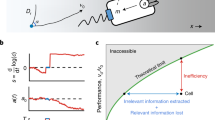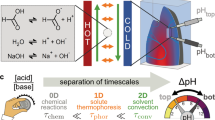Abstract
MR. YAPP'S communication on this subject1 is of considerable interest because it suggests that temperature may be a more suitable stimulus than pH for making a quantitative investigation of klino-kinesis in Paramecium. A quantitative study is required to discover how completely the klino-kinesis scheme describes behaviour in gradients.
This is a preview of subscription content, access via your institution
Access options
Subscribe to this journal
Receive 51 print issues and online access
$199.00 per year
only $3.90 per issue
Buy this article
- Purchase on Springer Link
- Instant access to full article PDF
Prices may be subject to local taxes which are calculated during checkout
Similar content being viewed by others
References
Yapp, NATURE, 148, 754 (1941).
Ullyott, J. Exp. Biol., 13, 265 (1936).
Gunn, Kennedy and Pielou, NATURE, 140, 1064 (1937).
Yapp, "Introduction to Animal Physiology" (Oxford, 1939).
Gunn and Walshe, NATURE, 148, 564 (1941).
Fraenkel and Gunn, "The Orientation of Animals" (Oxford, 1940).
Author information
Authors and Affiliations
Rights and permissions
About this article
Cite this article
GUNN, D. Klino-kinesis in Paramecium. Nature 149, 78–79 (1942). https://doi.org/10.1038/149078b0
Issue Date:
DOI: https://doi.org/10.1038/149078b0
Comments
By submitting a comment you agree to abide by our Terms and Community Guidelines. If you find something abusive or that does not comply with our terms or guidelines please flag it as inappropriate.



